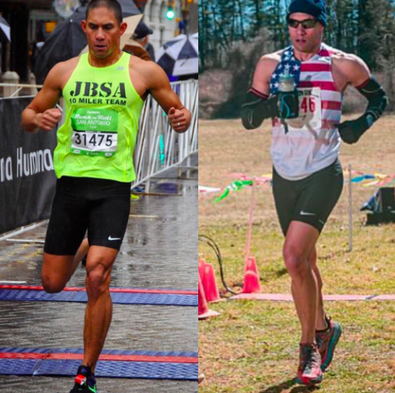|
“What’s harder..Road marathon or trail ultramarathon?” I’ll start by saying neither is “harder” than the other; both are more challenging in their own right. I will say that marathon is a more intense pain but that’s only one metric of “harder.” The marathon inflicts the punishment of repetitive strain being on the road for 26.2 miles, basically using the same muscles in the same way for hours. Some mild hills can create some variety, but that can also make the course slower (we’re assuming that the goal is to compete the courses in your fastest possible time). If the hills get too big, they can punish your quads on the downhills. But regardless, you can expect your legs to be VERY sore after a full effort road marathon, especially if part of the course takes you to concrete. The intensity of the road race is also higher as most competitive runners are working toward the upper half of their aerobic energy system. In the ultra, I was sore but not nearly as sore as after road marathons. To an extent, this shouldn’t be surprising because the ultra included bouts of walking during some uphills when I caught up to people on a single track and also when going through the later aid stations. Additionally, most ultras are contested mainly on soft surfaces, which inflicts less pounding. Add in the technical nature of many ultra courses and you have a recipe to spare your legs a bit…even though you have more ground to cover than on the road. One part of the race that surprised me in the ultra was how mentally exhausting it was to constantly monitor my foot placement. Unlike a road marathon where you try to cruise on autopilot for as long as possible, ultras require a different type of concentration. My plan in the ultra was to go out conservatively (which I did), but when we hit the first long downhill segment of switchback turns over and around rocks and roots and other obstacles, I found myself in a single file line on a single track trail, desperately trying to stay with the runner directly ahead as we FLEW down the trail. If I had my choice, I might have given way and allowed the train to roll through, but there was virtually no place to safely hop off the trail at that pace.
Road marathons have their own type of mental fatigue and it is mainly a product of our competition with the clock. There’s an expectation with a road marathon that you are going for a specific time, and part of the challenge is that the clock is unrelenting. The same can apply for a trail ultra but most people aren’t concerned about time down to the second, as we typically are on the road. So part of what makes the road more challenging is our own expectation, which I have built into this analysis. We need carbs to fuel our nervous system in addition to our muscles, and when we deplete our reserves late into a race, it can further tax our cognitive abilities in those final miles. Eating and drinking are definitely harder in a road marathon. Your pace is faster, which makes getting the food and drink into you more challenging. Because the pace is faster, you have more difficulty digesting food and thus have more limited choices that can work without causing problems. In an ultra, depending on the course and distance, it is possible to consume more “real” food rather than relying mainly or even entirely on sports nutrition. I have “only” done 50k which didn’t necessitate full meal consumption, but when you get into the 50 mile and beyond territory, you’ll need to be proficient at keeping greater volumes of food down, although the pace will likely get slower with the significant increase in distance, almost becoming a fast hike for some athletes. In sum, if your definition of hard is intensity of post-race pain and soreness, then the marathon is harder, without a doubt. Beyond that, each event has unique factors that make it challenging. Further, there are many other factors such as environmental conditions, pacing, nutrition and pre-event training status that could also impact the difficulty. They are both really hard, we can all agree on that!!!
0 Comments
Leave a Reply. |
AuthorAllan Phillips, PT, DPT is owner of Ventana Physiotherapy Archives
December 2023
Categories
All
|
2951 N. Swan Rd.
Suite 101, inside Bodywork at Onyx
Tucson, Arizona 85712
Call or Text: (520) 306-8093
[email protected]
Terms of Service (here)
Privacy Policy (here)
Medical disclaimer: All information on this website is intended for instruction and informational purposes only. The authors are not responsible for any harm or injury that may result. Significant injury risk is possible if you do not follow due diligence and seek suitable professional advice about your injury. No guarantees of specific results are expressly made or implied on this website.
Privacy Policy (here)
Medical disclaimer: All information on this website is intended for instruction and informational purposes only. The authors are not responsible for any harm or injury that may result. Significant injury risk is possible if you do not follow due diligence and seek suitable professional advice about your injury. No guarantees of specific results are expressly made or implied on this website.
Proudly powered by Weebly


 RSS Feed
RSS Feed